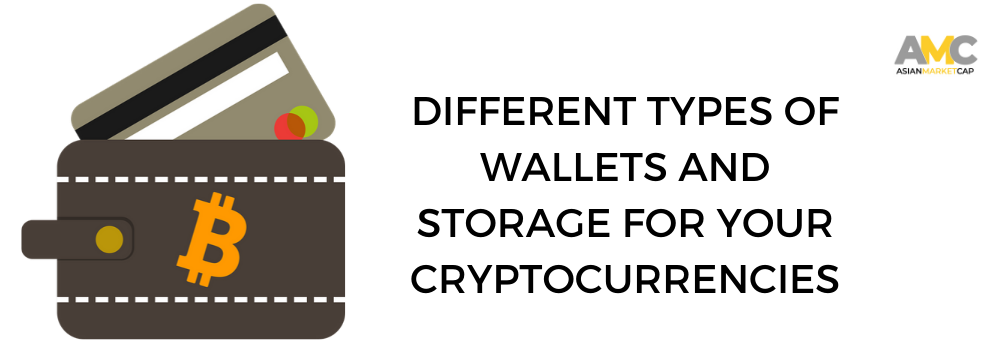By AsianMarketCap Official on The Capital

As cryptocurrencies like Bitcoin don’t exist in any physical shape or form, they can’t just be technically stored anywhere. Private keys — which are used to access your public Bitcoin or cryptocurrency addresses are the ones that need to be securely stored.
WHAT IS A CRYPTO WALLET?
A crypto wallet is a tool that you can use to interact with a Blockchain network. The simplest way to sift through the dozens of cryptocurrency storage methods available today is to divide them into three groups: software, hardware, and paper wallets. They may also be referred to as hot or cold wallets, depending on their working mechanisms.
HOW DO CRYPTO WALLETS WORK?
Crypto wallets don’t truly store cryptocurrencies. Instead, they provide the tools required to interact with a blockchain such as generating the necessary information (i.e., public and private keys) to send and receive cryptocurrency via blockchain transactions.
The wallet includes an address, which is an alphanumeric identifier, generated based on public and private keys. Such an address is a specific ‘location’ on the blockchain to which coins can be sent to.
Public key is a set of information that can be shared with others in order to receive funds while private key should never be disclosed to anyone as this gives access to your cryptocurrencies, regardless of which wallet you are going to use.
Even if your computer or smartphone gets compromised, you can still access your funds in another device as long as you have the corresponding private key (or seed phrase). Take note, however, that coins never truly leave the blockchain, they are just being transferred from one address to another.
Let’s take a quick look at specific features and functionality of varieties of crypto wallets.
HOT WALLET VS. COLD WALLET
As mentioned above, crypto wallets can also be defined as ‘hot or cold’ based on the way they operate.
A hot wallet is any wallet that is connected to the internet. This type of wallet is easy to set up and the funds are quickly accessible, making it convenient for traders and other users.
On the other hand, a cold wallet has no connection to the internet. Instead, it uses a physical medium to store the keys offline which makes it resistant to online hacking attempts. Cold wallet tends to be a safer alternative of crypto storage and is particularly suitable for long-term investors called ‘hodlers.’
SOFTWARE WALLETS
Software wallets come in different types. Each of them has its own unique characteristics. Most of them are somehow connected to the internet (hot wallets). The most common types of software wallets are: web, desktop, and mobile wallets.
1. WEB WALLETS. These can be used to access blockchain through a browser even without having to install or download anything from the web. Exchange wallets and other browser-based wallet providers belong to this type of software wallet.
In most cases, users can create a new wallet and set a personal password to access it. However, there are some service providers that hold and manage the private keys on your behalf. Users must take caution, that though this may sound convenient, this practice is dangerous as you’re trusting your funds to someone else.
Before choosing the most suitable wallet for you, make sure to check the technical approach of each wallet. When using cryptocurrency exchanges, consider using the protection tools available such as multi-factor authentication, anti-phishing code, and withdrawal address management.
2. DESKTOP WALLETS. A desktop wallet is a software that can be downloaded and executed on your computer. Unlike the web-based versions, desktop wallets give you full control over your keys and funds. When you generate a new desktop wallet, a file that contains the private key information which will be used to access your cryptocurrency address will be stored locally on your computer. If you encrypt your desktop wallet, you will be required to provide a password every time you run the software.
It is very important to back-up that important file that stores your private key or seed phrase so may still be able to access your funds on other devices, in case your computer becomes inaccessible.
In general, desktop wallets may be considered safer than most web-based version wallets. Just make sure your computer is clean of viruses and malware before setting up your wallet.
3. MOBILE WALLETS. This type of wallet functions much like a desktop wallet. It is quite convenient as it allows you to send and receive cryptocurrencies through the use of QR codes. Just as computers, however, mobile devices are vulnerable to malicious apps and malware infection. It is recommended that you encrypt your mobile wallet with a password and backup your private keys or seed phrase in case your mobile phone gets lost or broken.
HARDWARE WALLETS
Hardware wallets are physical, electronic devices that use a random number generator to generate public and private keys. These keys aren’t connected to the internet, they are just stored in the device itself. Therefore, hardware wallets are the type of a cold wallet and deemed as one of the most secure alternatives. They allow you to set up a PIN code to protect your device as well as provide a recovery phrase which can be used in case your wallet is lost.
However, hardware wallets tend to be less user-friendly and the funds are more difficult to access when compared to hot wallets. You should, therefore, consider using a hardware wallet if you plan to hold your cryptocurrencies for a long time or if you’re holding large amounts of cryptocurrency.
PAPER WALLETS
A paper wallet is a piece of paper on which a cryptocurrency address and its private key are physically printed in the form of QR codes which will then be scanned to execute cryptocurrency transactions.
Some paper wallet websites allow you to download their code to generate new addresses and keys while being offline. As such, these wallets are highly resistant to online hacking attacks and may be considered an alternative to cold storage. Paper wallets are not suitable for sending funds partially.
Having numerous flaws, it is now considered dangerous to use paper wallets and is highly discouraged.
SUMMARY
Cryptocurrency wallets are an integral part of using Bitcoin and other cryptocurrencies. They are one of the basic pieces of infrastructure that make it possible to send and receive funds through blockchain networks.
In the course of your interaction with cryptocurrencies and Blockchain technology, it is essential to master all the different types of crypto wallets as they are there to cater to different requirements and vary in terms of security, convenience, accessibility and so on.

To learn more about ASIAN MARKET CAP, visit our website at https://asianmarketcap.com/
Email us at listing@asianmarketcap.com.
Like and follow us in our social media accounts:
https://instagram.com/asianmarketcap.official/
https://twitter.com/asianmarketcap/
https://twitter.com/thecapital_io
Different Types of Wallets and Storage for your Cryptocurrencies was originally published in The Capital on Medium, where people are continuing the conversation by highlighting and responding to this story.
from The Capital - Medium https://ift.tt/3f7kwJI
0 Comments